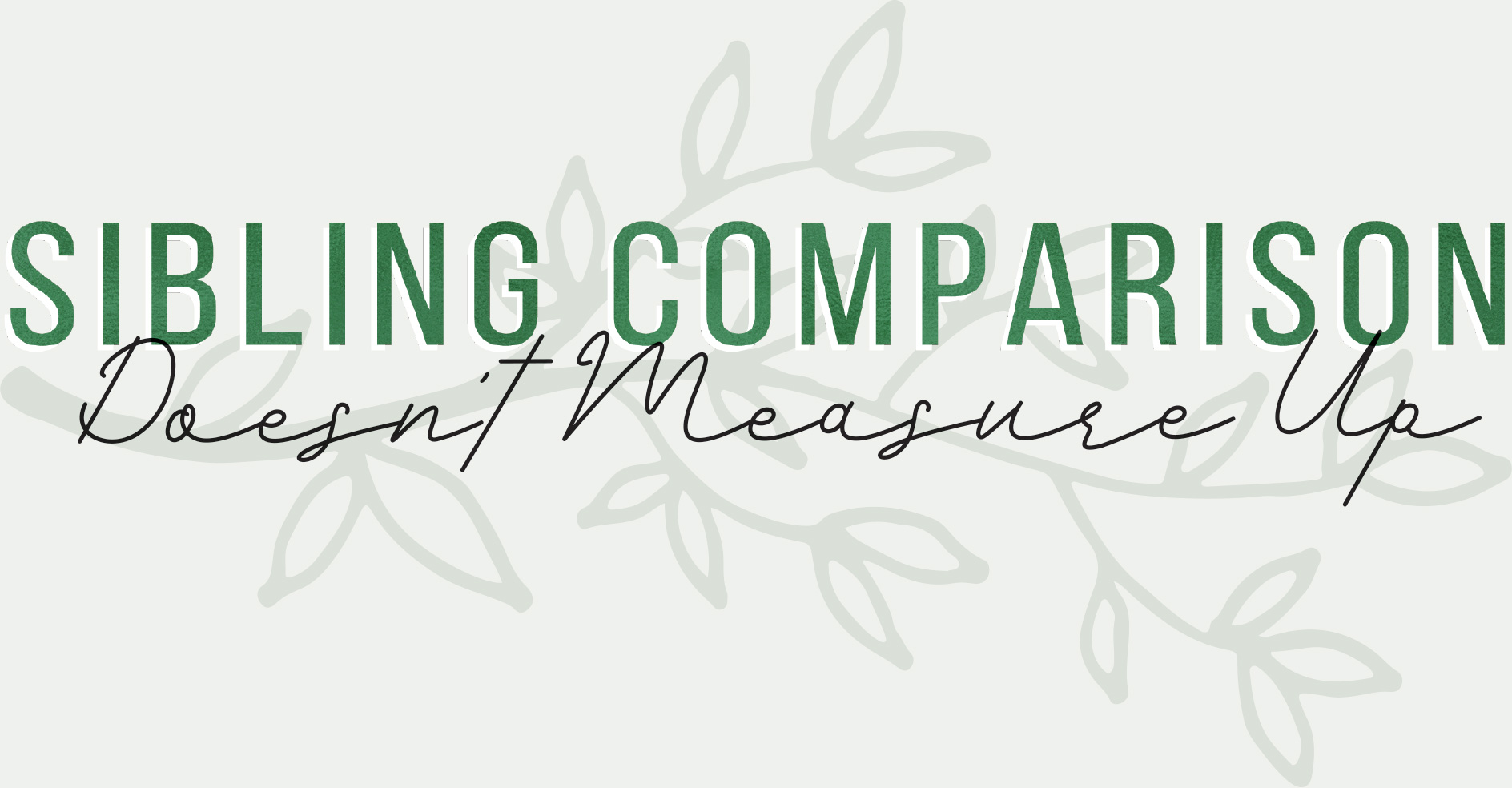![]() Enhanced – read by the author
Enhanced – read by the author



by Connie Albers
It’s common for parents to compare their children. In fact, 80% of parents admitted to doing it according to one study—which isn’t surprising. After all, we live together and see each other’s strengths and weaknesses. We know which children get their schoolwork done and which ones clean their room without being asked. We also know which ones don’t.
Yes, comparisons may be common, but they are also dangerous.
As parents, it is important to recognize that each child deserves to be appreciated as an individual. By celebrating the unique differences in our children instead of comparing them, we can help our children develop a healthy confidence in themselves and positive relationships with their siblings.
Consciously making an effort to appreciate each child’s specific strengths has created a more supportive and loving environment for my family. The good news is that you can, too!
- Upbringing. Some parents may have grown up in an environment where it was a normal occurrence. If their parents equated them to siblings or other children, they may have internalized this behavior and continue to practice it with their own children.
- Cultural norms. Some cultures place a lot of emphasis on achievement and success. This can lead parents to compare their children to others in an effort to motivate them to do better.
- Insecurity. Parents who are insecure about their own abilities or parenting skills may compare their children to others as a way of validating themselves or feeling more comfortable with their choices.
- Pressure. Parents may feel pressure from society or other parents to raise “successful” children. Comparison is a way to measure their children’s progress against others.
- Lack of awareness. Some parents may not even realize they are engaging in comparison. It may be an automatic response they have never thought to question or examine.
It’s important to note that there is no single cause of parental comparison, and it can be a complex issue with many contributing factors. However, by understanding some of the possible reasons why parents compare their children, we can begin to develop strategies to address this behavior and create a more positive and supportive environment for our children.
personal growth. There actually is a healthy way to do it. Done correctly, comparisons can be a powerful motivator that inspires children to work harder and strive for success. Healthy comparisons can motivate children by providing encouragement and inspiration.
But we have to be very careful as parents, because comparisons tend to be unhealthy—often said without thinking or out of our own frustration.
“Why can’t you be more like your sister? She always gets straight A’s and never causes me any trouble.” Or, “Your brother was a star athlete in high school. Why can’t you even make the team?”

Understand that sibling comparison is not limited to just verbal comparisons. It can also be implied through our actions or nonverbal cues, such as body language, facial expressions, or tone of voice. For example, a parent who is constantly praising one child in front of his or her siblings, while ignoring or criticizing another child, can create a negative dynamic between them that can have long-lasting consequences.
- Create an unhealthy competition between siblings. When children constantly feel they are being measured up to a sibling, they can develop deep-seeded jealousies and resentment. Eventually there will be a breakdown in their relationships.
- Lead to the development of low self-worth. When children are always being reminded of a sibling’s achievements or accolades without recognition of their own unique accomplishments, they may begin to see themselves as never good enough. This can then manifest itself in poor and destructive behavior.
- Result in suppressed individuality. When siblings are constantly compared to one another, they may feel pressured to conform to a certain mold or persona, instead of being their true selves. Children who feel they would be better off being like someone else may feel confused, isolated, or even depressed.
- Foster a lack of trust and respect between siblings. When one sibling feels they are being compared unfavorably to the other, it can create a sense of mistrust or even hostility. This can be especially harmful in adult relationships, as siblings may struggle to maintain a close bond later in life.
- Hurt your relationships with them and how they feel about themselves. Children who are constantly compared to their siblings may begin to feel inadequate, unloved, or even rejected by their parents.
- Evaluate why you’ve been comparing your children. Knowing why we do things is the first step to changing a behavior. Think through the list above and reflect on your own upbringing. Once it’s been identified, it can be dealt with.
- Recognize the unique strengths and weaknesses of each child. Rather than comparing siblings, focus on their individual strengths and weaknesses, encouraging each child to develop his or her own talents and skills. Be intentional to talk about what is good and right in each child in front of one another. Children need public affirmation from us. It doesn’t have to be constant praise, but enough so your children know you notice them for who they are.
- Celebrate differences. Emphasize the positive aspects of each child’s individuality. Encourage your children to explore their own interests and hobbies. If you have a large family like me, time and budget will dictate how much each child can do.
- Avoid labeling. Be careful not to label one child as the “smart one” or the “athletic one.” While we generally don’t mean to put labels on our children, it can happen if it’s repeated too often. These labels can create pressure and unrealistic expectations.
- Create a positive family culture. Foster a positive family culture where each child is valued and appreciated individually. Celebrate accomplishments, but also encourage each other through setbacks and failures.
- Acknowledge and validate their feelings. Let them talk to you or someone you trust or have them write down their thoughts and emotions in a journal (just be sure their siblings don’t read the entries). Remember, their feelings are valid and it’s okay to feel hurt, angry, or frustrated.
- Focus on their unique strengths. Instead of dwelling on the ways they could do things better, focus on their unique strengths and accomplishments. Take time to reflect on their achievements and qualities that make you proud. Embrace their individuality and celebrate those differences.
- Improve your communication with your children. Open and honest communication is key to any relationship, including the one with their siblings. Talk to your children about how you didn’t mean to hurt them. Then, set a time when your children can share how they felt when you compared them to others. Try to express your feelings without blaming, attacking, or justifying. Find ways to encourage family members to support each other’s strengths and weaknesses.
If you think you’ve been comparing your children and realize you’ve caused some damage to their relationship, don’t panic, pray! Your children’s self-esteem, lack of trust, or resentment can be rebuilt. God is in the repairing business.


